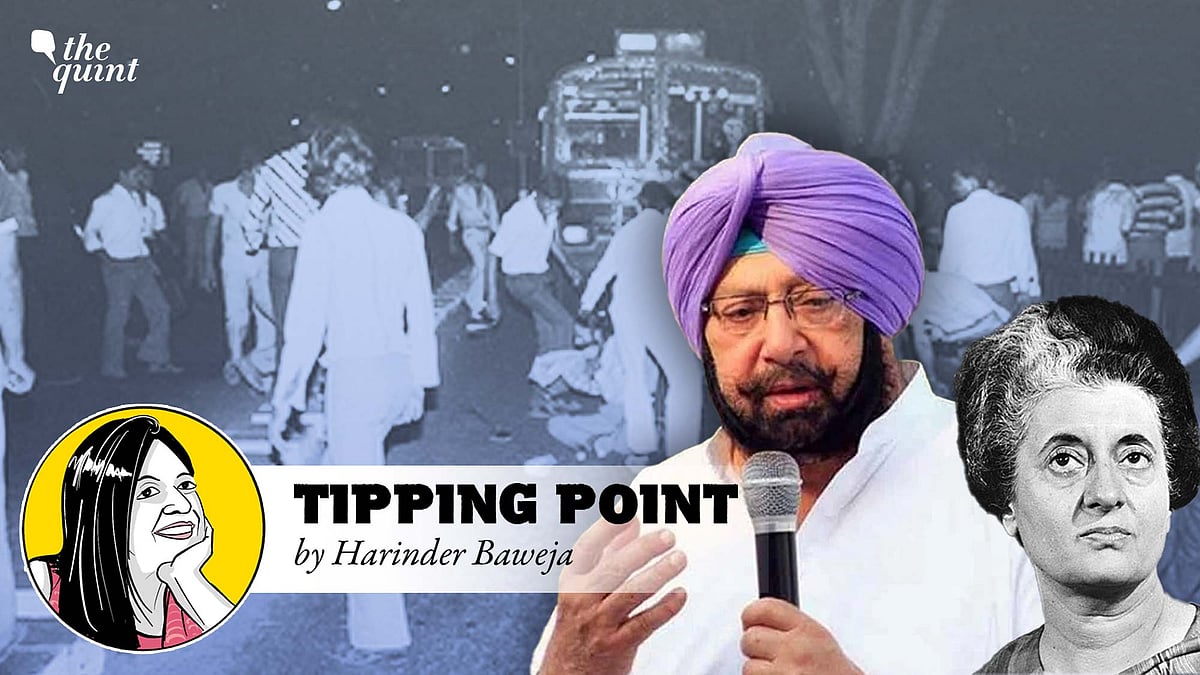‘Bhindranwale Never Wanted Khalistan’: Captain Amarinder Singh Interview
Captain Amarinder Singh speaks about secret meetings with Bhindranwale to memories of bodies floating in the naalas.

advertisement
From secret meetings with Bhindranwale to memories of “bodies floating in the naalas”, Captain Amarinder Singh speaks to senior journalist Harinder Baweja on the unrest, betrayal, and violence of 1984.
In the in-depth interview for The Quint, he discusses the breakdown of negotiations, his resignation after Operation Blue Star, going back to the Congress, and if dialogue would have helped script 1984 differently.
Edited excerpts from the interview:
41 years have passed since 1984, but the wound remains deep. You were briefing committees of ministers and senior secretaries. Could 1984 have been scripted differently? Could dialogue have worked?
Of course dialogue would have worked—and that is exactly what we were doing. There were three tiers. The first tier was between the Prime Minister and Santa Singh Longowal. The entire issue was based on the Anandpur Sahib Resolution, passed in 1973 and adopted in 1978.
The second tier involved three Union ministers and representatives from the Akali Dal.
The third tier was Ravinder Singh (former Speaker from the Akali Dal) and myself, along with three senior secretaries—Principal Secretary Dr. Alexander, Cabinet Secretary Krishnaswamy Rao Sahib, and Home Secretary Mr. Chaturvedi.
We did groundwork, it went to the ministers, and then to the top. The objective was to reach a solution through dialogue.
Why did the talks between Indira Gandhi and Jarnail Singh Bhindranwale fail? You were central to this entire process.
It wasn’t really between the two of them. Talks were primarily with the Akali Dal on the Anandpur Sahib Resolution.
The first breakdown happened on a trivial issue—whether the Frontier Mail should be called the Darbar Sahib Express. When such futile issues stalled progress, Bhindranwale’s group felt negotiation wouldn’t work and “the answer is the gun.”
From 1982, when he moved into the Golden Temple complex, the situation deteriorated. I used to meet him there at night or during the day. But by then, the militant line had taken over.
You revealed to me, and I've put that in my book, which was released recently, that you were asked to fix meetings between Bhindranwale and Rajiv Gandhi, the son of Indira Gandhi. Can you detail that for us, please?
After Sanjay Gandhi died, Rajiv became MP and General Secretary. We were in touch. One day he told me he met Longowal and asked if he could meet Bhindranwale. I sent a message, and Bhindranwale agreed.
The meeting was to be held at Ambala Air Force Station—high security, away from Punjab, so there’d be no leaks.
We fixed a date, and Rajiv and I drove to Safdarjung to take an aircraft—not an Air Force plane, but Swami Dhirendra Brahmachari’s aircraft. Before we reached, we got a message to return.
Fifteen days later, we tried again. We got airborne, halfway to Ambala, and again we were told to return.
Later we learned the meeting had leaked. Chief Minister Darbara Singh claimed an “ambush” was being planned. Impossible in an Air Force station. But Indira Gandhi had already lost one son—she didn’t want to risk the other.
She told me later, “He was my Chief Minister; I had to believe him.”
So yes, the talks were sabotaged.
So finally, 1984 happened, the army tanks rolled into the Golden Temple. You were a Congress MP. Clearly, the dialogue didn't work. You resigned as the Congress MP. What were your feelings and thoughts at the time? Why did you decide?
I told Mrs. Gandhi by the time it was building up, that I fear that this is going to lead into confrontation . You're going to have to enter, because by that time, Sant Bhindranwale had ensconced himself in the vasa. He was there permanently, he never came out after that .
I told Mrs. Gandhi, I said, my family holds everything to the Sixth Guru, Guru Hargobind Sahib, which was the creator of the Akal Takht . I said, "This is… we owe everything to the Chamu Pacha... Now, if you do this, if you send the army in, I will not stay with you."
I was playing golf in Shimla when this… when this thing happened, the Golden Temple was assaulted . I came back, and I called my other colleagues... They all backed out one after the other, and it was left to me to go. I went to her house... I gave my resignation. She said, "Why are you doing this?" I said, "I told you. I'm not going to stay with you for this."
Then Rajiv came... I told him, "I'm sorry, Rajiv, I said, we've been friends since 1954... But there are some things that go beyond this, and that is my religion."
So we're talking about 1984, which saw so many violent incidents, first the rolling of the tanks into the Golden Temple. Then the assassination of a serving Prime Minister. And then the carnage against the Sikhs who were hunted and killed in the most horrifying manner.
I was there. I went around the whole of Delhi. I saw bodies floating down in the naalas . All those people who ran away from their homes took shelter in the gurdwaras there. My impression there was that there was a massacre .
A brigade from Meerut came to the Yamuna Bridge, where before entering Delhi, they were halted. They were not allowed to come in. He stayed there for 24 hours. Had the brigade come in, they could have saved so many lives in that area.
Watch the full interview.